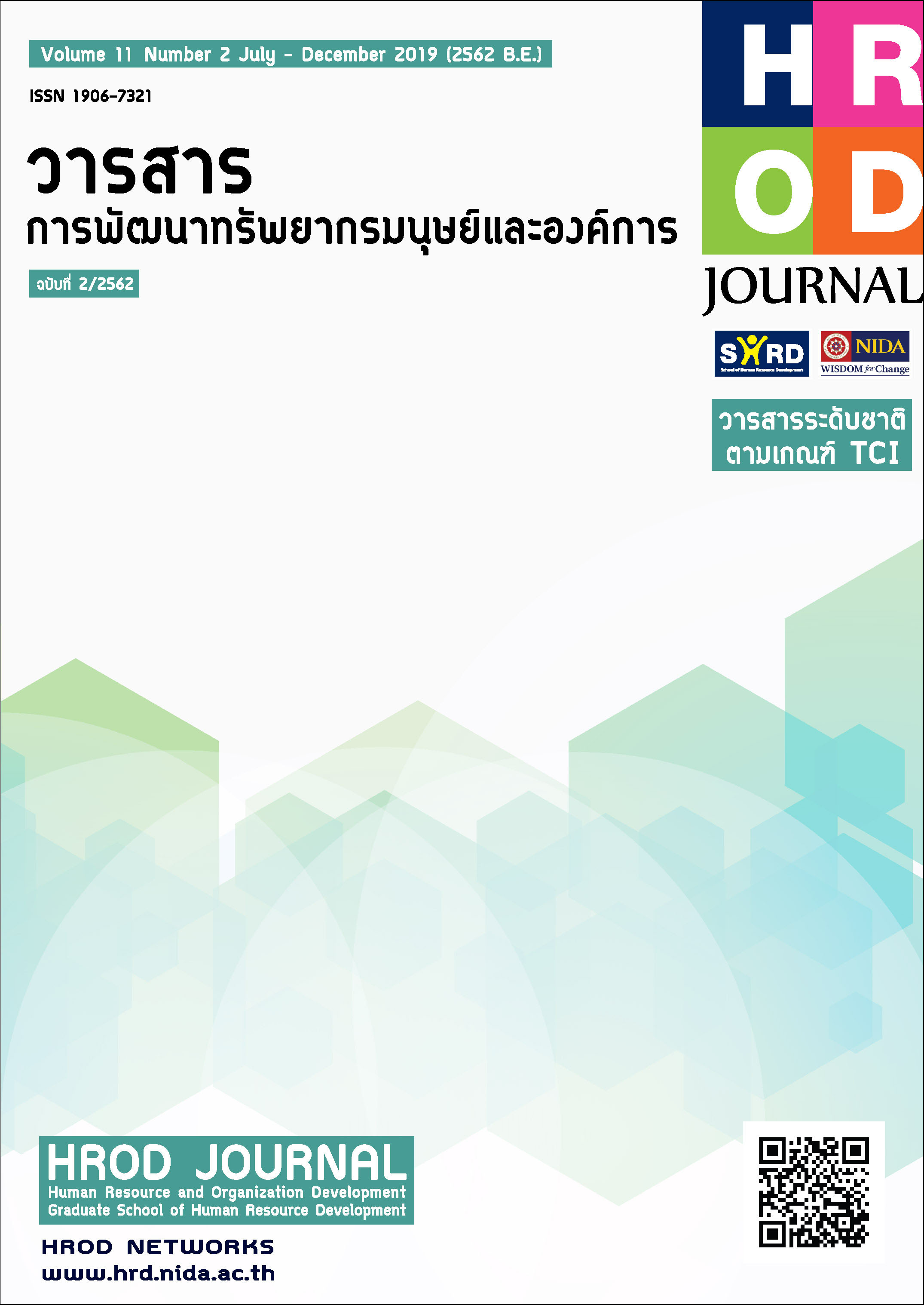Factors and Benefit for Organizations in Hiring Former Convicts to Work in Organizations
Main Article Content
Abstract
The objectives of this study were to 1)Explore factors that encourage employers to hire former convicts to work into their organizations 2) Understand the benefits organizations gain from hiring former convicts. The present study was based on a qualitative research designed. Data was collected by conducting in-depth interviews with samples of 5 business owners from 5 organizations that hire former convicts into their organizations and 5 former convicts already hired by 5 organizations. Using content analysis, the findings revealed that: 1) The 7 factors leads to hiring former convicts were: 1.1) Self-Development 1.2) Honesty and Integrity 1.3) Opportunity Giving 1.4) Self-Determination 1.5) Competency Match 1.6) Offense level of crime 1.7) Lack of labor. The business owners mentioned all 7 factors; Whereas the former convicts mentioned the first 4 factors only. 2) The benefits of accepting former convicts to work in organizations involved 2.1) Social benefits form preventing former convicts to return to illegal activities 2.2) Organizational benefits from the knowledge of former convicts that most people don’t have; 2.3) Organizational benefits from loyal and diligent from the appreciation of the opportunity the organizations given them.
Article Details
1) The content of article in HROD journal is the author’s wholly responsibility to research, analyze, summarize, compile, and reference data. The editorial department will not be responsible in anyway.
2) The submitted articles in HROD journal must be unpublished before and must not be currently under consideration for publication elsewhere. If it is detected for its repetition, the author must be responsible for infringement of copyright.
3) Authors will be asked to transfer copyright of the article to the Publisher. The article is prohibited to reproduce all or part of the text, unless allowed.
References
กิตติบดี ใยพูล. (2544). ปัญหาการละเมิดสิทธิมนุษยชนในประเทศไทย: ศึกษาเฉพาะกรณีการเลือกปฏิบัติที่ไม่เป็นธรรมต่อ ผู้พ้นโทษในการเข้าทำงาน. (วิทยานิพนธ์ปริญญามหาบัณฑิต ไม่ได้รับการตีพิมพ์). มหาวิทยาลัยรามคำแหง, กรุงเทพฯ
ณัฐนันท์ วิจิตรอักษร. (2561). ‘คนติดคุกซ้ำ’ ปัญหาที่เริ่มรุนแรงและอาจเรื้อรัง. กรุงเทพธุรกิจ. ค้นเมื่อ 24 ตุลาคม 2561, จาก https://www.bangkokbiznews.com/blog/detail/640564
ธันยพร บัวทอง. (2561). ‘แม่’ ผู้ให้ชีวิตใหม่แก่ผู้ต้องขังหญิงผ่านร้านนวด. ค้นเมื่อ 15 เมษายน 2561, จาก https://www.bbc.com/thai/thailand-42594778
นันทนา ชัยจิตวนิช. (2534). ความเป็นไปได้ในการพัฒนาบทบาทขององค์กรเอกชนต่อการสงเคราะห์หลังปล่อย: ศึกษาเฉพาะกรณีองค์กรเอกชนในเขตกรุงเทพมหานคร. (วิทยานิพนธ์ปริญญามหาบัณฑิต ไม่ได้รับการตีพิมพ์). มหาวิทยาลัยธรรมศาสตร์, กรุงเทพฯ.
บีบีซี นิวส์ ไทย. (2558). ร้านอาหารที่พนักงานทั้งร้านเป็นนักโทษหญิง. ค้นเมื่อ 21 กันยายน 2561, จาก https://www.youtube.com/watch?v=hYHXGhtypNI
ปิยะนุช เงินคล้าย และพงศ์สัณฑ์ ศรีสมทรัพย์. (2556). โครงการศึกษาวิจัยการจัดตั้งองค์กรช่วยเหลือผู้พ้นโทษ. วารสารกระบวนการยุติธรรม, 9(2).
พรชัย ขันตี. (2553). ทฤษฎีอาชญาวิทยา: หลักการงานวิจัยและนโยบายประยุกต์. กรุงเทพฯ: โรงพิมพ์ หจก.สุเนตร์ฟิล์ม.
มนตรา งามวาจา. (2555). แนวทางการพัฒนาการสงเคราะห์ผู้กระทําผิดหลังปล่อย. (วิทยานิพนธ์ปริญญามหาบัณฑิต). มหาวิทยาลัยมหิดล, กรุงเทพฯ.
สิทธิภา โลจายะ. (2554). การยอมรับเข้าทำงานของผู้บริหารต่อผู้พ้นโทษหญิงที่ได้รับการฟื้นฟู: ศึกษากรณีโรงงาน อุตสาหกรรม จังหวัดสมุทรปราการ. (วิทยานิพนธ์ปริญญามหาบัณฑิต ไม่ได้รับการตีพิมพ์). จุฬาลงกรณ์มหาวิทยาลัย, กรุงเทพฯ.
Becker, H.S. (1963). Outsider: Studies in the Sociology of Deviance. New York: The Free.
Hirschi, T. (1969). Causer of delinquency. Berkeley. CA: University of California Press.
Mutthanuch M. (2017). Women in Prisons for drug-related offences: Challenge of Decriminalisation and Putting the ‘Bangkok Rules’ into practice in order to solve prison overcrowding in Thailand (Unpublished doctoral dissertation). University of Aberdeen.
Rogers, E.M. (1983). Diffusion of Innovation (3rd ed.). New York: The Free Press.
Svönudóttir, S. O. R. (2015). A study on repeat offenders’ experience in society between prison sentences in Iceland. (Unpublished master’s thesis). Aalborg University: Aalborg East.
Translated Thai References
Buatong, T. (2018). ‘Mae’ phu hi cheevitmai kar phutongkhung [‘Mother’ who gives new lives to female inmates through massage shop]. Retrieved April 15, 2018, from https://www.bbc.com/thai/thailand-42594778
Chaijitwanich, N. (1991). Possibilities for developing the role of private organizations in hiring former convicts: A case study of private organizations in Bangkok. (Unpublished Master’s thesis). Thammasat University, Bangkok.
Department of Corrections, Ministry of Justice. (2018). Rayngan satati phutongkhang tuapated [Corrections Statistics Nationwide Report]. Retrieved October 24, 2018, from https://www.correct.go.th/rt103pdf/report_index.php#
Khantee, P. (2010). Tidsadee achayavittaya: lakkarn nganvijai la nayobayprayuk [Criminological Theory: Principles of Research and Applied Policy]. Bangkok: Sunetfirm Printing.
Lojaya, S. (2011). Management’s acceptance of hiring female former convicts who had been through rehabilitate program: A case study of a factory in Samutprakarn. (Unpublished Master’s thesis). Chulalongkorn University: Bangkok.
Ngamwajava, M. (2012). Guidelines for the development of housing aid for offenders after release (Unpublished master’s thesis) Mahidol University: Bangkok
Ngernklai, P., & Somsomsub, P. (2016). A research project on establishing the organization to assist the acquittal. Journal of Justice Process, 9(2).
Thai BBC News. (2015). Ran arharn ti panakngan tung rang pen naktodying [The restaurant that all employees were female former convicts]. Retrieved September 21, 2018, from https://www.youtube.com/watch?v=hYHXGhtypNI
Wichitaksorn, N. (2018). ‘Kon tid kuk sum’ Punha ti arj runrang la ruearung ['Repeat offenders' are serious and potentially chronic problems.]. Bangkok Business. Retrieved October 24, 2018, from https://www.bangkokbiznews.com/ blog/detail/640564
Yaipool, K. (2001). Human Rights Violation Problem in Thailand: A Case Study of Unfair Treatment of Hiring Former Convicts. (Unpublished doctoral dissertation). Ramkhamhaeng University, Bangkok.


